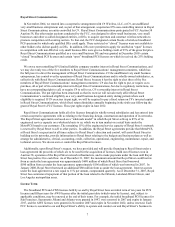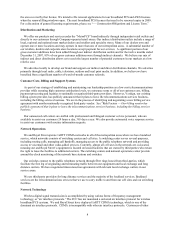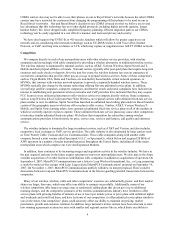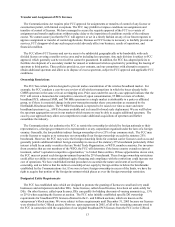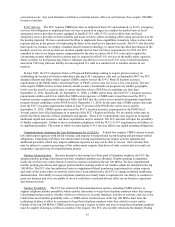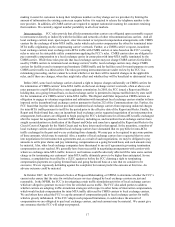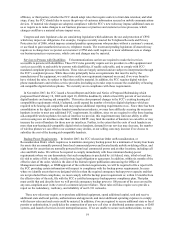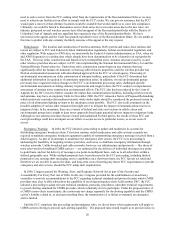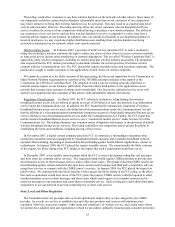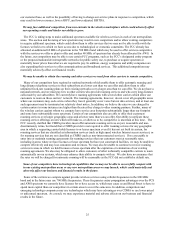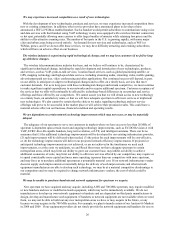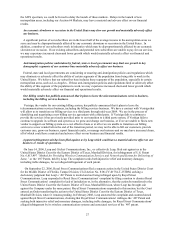Metro PCS 2007 Annual Report Download - page 28
Download and view the complete annual report
Please find page 28 of the 2007 Metro PCS annual report below. You can navigate through the pages in the report by either clicking on the pages listed below, or by using the keyword search tool below to find specific information within the annual report.
17
making it easier for customers to keep their telephone numbers as they change service providers by limiting the
amount of information the existing carrier can require before it is required to release the telephone number to the
new provider. In addition, all CMRS carriers are required to support nationwide roaming for customers retaining
their numbers. We currently support number portability in all of our markets.
Interconnection. FCC rules provide that all telecommunications carriers are obligated upon reasonable request
to interconnect directly or indirectly with the facilities and networks of other telecommunications carriers. And all
local exchange carriers must, upon request, enter into mutual or reciprocal compensation arrangements with CMRS
carriers for the exchange of intra-MTA traffic, under which each carrier compensates the other for terminated intra-
MTA traffic originating on the compensating carrier’ s network. Further, at a CMRS carrier’ s request, incumbent
local exchange carriers must exchange intra-MTA traffic with CMRS carriers at rates based on the FCC’ s costing
rules or rates set by state public utility commissions applying the FCC’ s rules. CMRS carriers also are obligated to
pay reasonable compensation to a local exchange carrier in connection with intra-MTA traffic terminated by the
CMRS carrier. While these rules provide that local exchange carriers may not charge CMRS carriers for facilities
used by CMRS carriers to terminate local exchange carriers’ traffic, local exchange carriers may charge CMRS
carriers for facilities used to transport and terminate CMRS traffic and for facilities used for transit purposes to carry
CMRS carrier traffic to a third carrier. The rules governing interconnection are under review by the FCC in a
rulemaking proceeding, and we cannot be certain whether or not there will be material changes in the applicable
rules, and if there are changes, when they might take effect and whether they will be beneficial or detrimental to us.
Before 2005, some local exchange carriers claimed a right to impose charges unilaterally on CMRS carriers for
the termination of CMRS carriers’ intra-MTA traffic on the local exchange carrier’ s network, often at above-cost
rates pursuant to a tariff filed before a state regulatory commission. In 2005, the FCC issued a Report and Order
holding that, on a going forward basis, no local exchange carrier is permitted to impose tariffed rates by state tariff
for the termination of a CMRS carrier’ s intra-MTA traffic. This Report and Order imposed on CMRS carriers an
obligation to engage in voluntary negotiation and arbitration with incumbent local exchange carriers similar to those
imposed on the incumbent local exchange carriers pursuant to Section 252 of the Communications Act. Further, the
FCC found that its prior rules did not preclude incumbent local exchange carriers from imposing unilateral charges
for intra-MTA traffic pursuant to tariff for the period prior to the effective date of the Report and Order. Finally, the
Report and Order found that, once an incumbent local exchange carrier requested negotiation of an interconnection
arrangement, both carriers are obligated to begin paying the FCC’ s default rates for all intra-MTA traffic exchanged
after the request for negotiation. Several CMRS carriers, including us, and incumbent local exchange carriers have
sought reconsideration or clarification of the Report and Order and some have appealed the Report and Order to the
Circuit Court of Appeals for the Ninth Circuit and we have intervened in that appeal. In the meantime, a number of
local exchange carriers and incumbent local exchange carriers have demanded that we pay bills for intra-MTA
traffic exchanged in the past and we are evaluating those demands. We may pay or be required to pay some portion
of these amounts, which may be material. Also, a number of local exchange carriers have requested that we enter
into negotiations for interconnection agreements and, as a result of such negotiations, we may be obligated to pay
amounts to settle prior claims and pay terminating compensation on a going forward basis, and such amounts may
be material. Also, other local exchange companies have threatened to sue us if agreements governing termination
compensation are not reached. We generally have been successful in negotiating arrangements with carriers with
whom we exchange intra-MTA traffic; however, our business could be adversely affected if the rates some carriers
charge us for terminating our customers’ intra-MTA traffic ultimately prove to be higher than anticipated. In one
instance, a complaint has been filed by a CLEC against us before the FCC claiming a right to terminating
compensation payments on a going forward basis and going backward basis at a rate that we consider to be
excessive. We are vigorously defending against the complaint, but cannot predict the outcome at this time. An
adverse outcome could be material.
In October 2007, the FCC released a Notice of Proposed Rulemaking, or NPRM, to determine whether the FCC’ s
current rules ensure that the rates for switched access services charged by local exchange carriers are just and
reasonable. In the NPRM, the FCC is investigating certain traffic stimulation activities of local exchange carriers
which are alleged to generate excessive fees for switched access traffic. The FCC also asked parties to address
whether carriers are adopting traffic stimulation strategies with respect to other forms of intercarrier compensation,
which would include compensation for intra-MTA traffic delivered by CMRS carriers to local exchange carriers.
We and others have asked the FCC to cap the amount of compensation paid to local exchange carriers for traffic
which is grossly imbalanced. If the FCC adopts such proposed limitations, it could reduce the amount of
compensation we are obligated to pay local exchange carriers, and such amount may be material. We cannot give
any assurance that the FCC will adopt our proposal.


